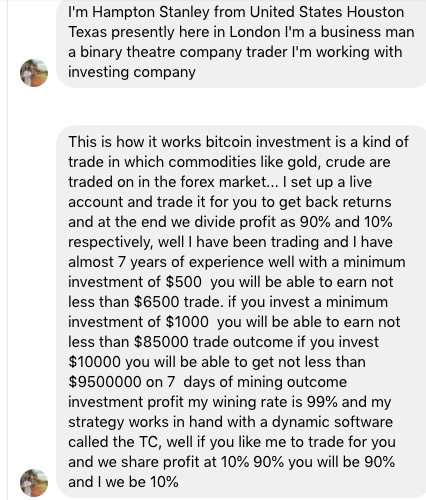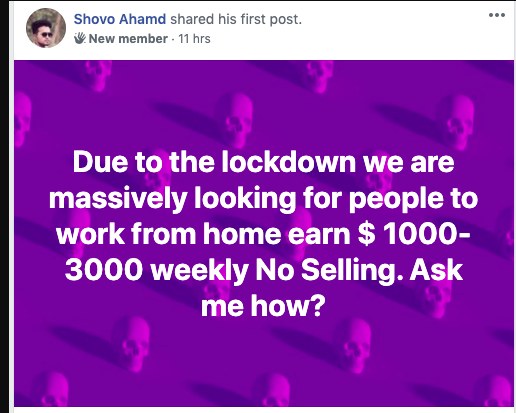With the CoVid19 lockdowns, institutionalised work-from-homes, job losses and more time than ever on hand, work-from-home jobs have seen a surge in popularity. And along with the legit online opportunities, newer job descriptions, and genuine remote gigs, have come scams. As I’d discover after days of a sting operation, the internet is replete with thousands of unscrupulous con artists out to trap those unsuspecting folks who’re all but looking to find an alternate, easy enough income stream to tide over these tough times. These are no Nigerian princes looking for a quick transfer to their bank for an emergency. These are social media savvy, elaborate smooth operators. But just not quite perfect enough to not set off the alarm signs flashing.
Explosion of “work-from-home, make $1000 a day” posts all over Facebook
I’d been noticing a multitude of posts with outrageous promises such as “Make $1000 a day working from home through trading robots” to more subdued claims like “Regular source of income with just a few hours of work” pop up all over Facebook groups all of late.
While work-from-home jobs of a dubious nature have existed all along, the frequency, the number and the rewards promised by these specific ads aroused suspicion.

I decided to check them out for myself. I began contacting the people who were posting these kind of posts on the groups, pretending to be interested in making money. My first lead turned out to be exactly what I’d been suspecting all along. An elaborate campaign leveraging every trick in the book to sell an online training course.
Online Coaching Course or was it?
Now if you have just tuned into this part of the internet, selling professional courses online is the new startups. All around, self-proclaimed marketing/social media/business gurus are turning “online coaches” offering a carefully crafted course to help you make money – like themselves. The buildup for these courses runs over Facebook ads, never-ending landing pages, lead magnets, free webinars, and of course a rapidly increasing price if you didn’t “buy it within the next 24 hours”. The pitch involves a rags-to-riches story, a man in a fancy car who’s now able to work from anywhere in the world. Cut to pictures of the man sipping martinis in an infinity pool in an exotic location. And you know it’s a common enough phenomenon when there’re memes around it.

Disclaimer: This is not to discredit online courses altogether. Why, some of them are genuinely crafted by experts who have spent years in the field, and even if more hype than substance, more often than not, they do contain a useful takeaway or two. But in this case, behind all the mumbo-jumbo about “making thousands a day working from home” lay a long con. After talking to a few of them, who ensured that I was “really interested in making money”, I was pointed to a 33-minute long video where the pitch for the program or the course was made. A man in his forties, and shooting in an unflattering angle on a less-than professional camera held forth about how he made thousands of dollars per month from this one thing. He talked about his life pre-discovery of this financial elixir, and how it changed overnight once he started making all this money. Screenshots from his “account” were shared for good measure with the amount coming into his account always being a perfectly rounded $1000, $2000, $5000 and so on. He insisted that one buys a Gold not a Silver package for most benefits, but hold on to buying the “diamond package” as that was for advanced users.

I asked the agent on chat if there was free trial or a preview I could check out before buying a silver/gold or diamond package, but no such luck. I was curtly turned down. “This is a business mam”, was the retort.
I decided to explore further and contacted a few other posters. A few of them turned out from the same team that was selling the “25Dollar1up” affiliate marketing program. So, by now I knew a fair number of these WFH job-posters belonged to the same team or in fact were the same one person plugging the affiliate marketing course.
Maybe it was the Baader-Meinhof phenomenon, but I started noticing these posts everywhere. Multiple groups, different accounts, different styles and wording. But the message was the same: Work from home, invest only a little, and make large amounts of money with just a few hours of work and/or a Facebook account.

The more I spoke to the posters of these, I more I began to connect the dots.
An affiliate marketing/MLM scam that ran meta
All this time, I had told myself that it wasn’t a real scam. It was only a common, if shady, growth hack to sell an online marketing source. Little did I know how little the course had to do marketing.
The only real profile I managed to speak with, unwittingly gave me the skinny and gave away the entire modus operandi himself. Turns out that the “program” was not about a real affiliate marketing course at all. (the one where they teach you how to make commissions on products sold through your efforts, like by placing links on your website.) Not all the accounts posting these “Work-from-home” offers were fake. Most were, but some were genuine accounts that were working as commission agents. For every referral they got for a paid course, they got a commission.

So, here’s how it works. These Facebook posts promise you a regular source of income if you purchase the “online program’ starting $135 going upto $600. The people who’re spamming the groups with these messages are all commission agents. They get upto 60% of the “fees” the ultimate customer pays as their commission and rest goes to the ‘online coach’ – the kingpin of the operation who claims to make his millions from the same technique, in this case the owner of the 25Dollar1Up. If you’re familiar with the famous Oriflame/Avon MLM (Multi-Level Marketing) model, this would ring a bell. But unlike an Oriflame/Avon, there’s no real product here. There’s no virtual product either. The paid program claims to teach Affiliate marketing. What they do to sell these programs IS affiliate marketing. So basically one pays to learn how to make money to do the same to another person. If Ankit, my real account lead, is to be believed, he has managed to net a revenue of $600 a month, on-boarding 20 people for the program. That’s 20 people now who’re going to be spamming the groups, trying to find 200 others to do the same and so on. It’s a vicious circle. An online Ponzi scheme if you will. And it’s for a good reason that MLM schemes blur the lines between being a shady and an outright illegal practice, so much that Google or Facebook don’t even allow advertising on their platforms.
Enter Bitcoin Trading: A Bigger Scam
All this time, I noticed a few different kinds of posts too. Like the one below. For one, this wasn’t a Pakistani / Bangladeshi man, and the stakes ran higher. While the affiliate marketing course sellers kept their expected awards somewhere in the $100-500 a day region, this post raised the bar with its $5000 every-3-days claim.

Hoping to make over $1000 a week, I dived in. After me showing interest in what he had to offer, the man introduced himself as Hampton Stanley from the US, a “Binary Theatre Company trader working with an investing company.” Red flag number one.

His offering was a Bitcoin investment scheme that required one to invest a certain sum every month, which would be traded on the Cryptocurrency exchange on the client’s behalf, against a promise of a minimum 10x reward on a weekly basis. (!!!)
I decided to dig deeper where Hampton advised moving the conversation to Whatsapp. (Perhaps because Facebook could come under the mod radar, but Whatsapp is encrypted?)
Hampton Stanley kept asking me if I was “ready to change my life right away.” I wanted to know what happened if I lost my money, or never heard from him again. I needed a proof of the legal validity of the company.

In response, he sent me an ID badge bearing his own photo (quickly deleted) that’s associated with attending conferences, hardly a govt-issued legally binding ID proof. The business certificate too did not have any authentic-looking information. It’s unlikely a govt would issue a bitcoin trading certificate, leave alone one full of typos and grammatical mistakes
There was a fancy Bitcoin trading website too
Upon my request for a fact-sheet or document with FAQs, terms and other literature on his business, Hampton Stanley linked me to the website called Fittyinvest.com. On the first look, the site looked like your average modern landing page with the details, the product, the CTA and of course the testimonials.
But upon digging deeper, I unearthed the first tangible signs of an elaborate scam.
The testimonials were all gushing, and came from good-looking yuppies seemingly in their 30s. Having smelled a rat early on, I ran a reverse image-search on some of them.

And there you had it! Smith Carter from Fittyinvest was Keath Heathman on Heugens trading – Another identical Bitcoin trading site. Fittyinvest’s “top investors” Anna Lucie, Roxy Chanslor, and Adams Aubrey were incidentally top investors Daphine Nihisoka, Carissa Frido and Euna Lucarelli respectively on Heugens trading.

Both the websites had suspiciously similar investment packages too.


Having established that both Fittyinvest and Heugens Trading were run by the same person or same team that was probably running a whole host of other sites, I played along more. This time I contacted another work-from-home agent who’d also promised a weekly income of $1000-3000.

Having no friends or other posts on his profile was a dead giveaway that this profile too was a fake one created just to spam the groups about the BitCoin trading scheme. By now I knew the drill. “Shovo” mentioned it upfront that it was a BitCoin trading scheme and that he would be investing on my behalf. All I had to do was cough up some money to begin with, and rest would be taken care of by their team.

Fake testimonials, Fake ID proofs, Fake certificates
Just like Stanley from the previous time, he pretty much promised the same returns against a similar investment. Once the conversation moved to Whatsapp, I asked him the usual hygiene questions about safety of my money, guarantee of returns, and proof of their identity. Here’s when Shuvo started hesitating and even getting uncomfortable. He sent me the link to a website, which he quickly deleted before I could even screengrab it, and photo of a certificate – again deleted quickly – one that looked more like a high-school MS Paint project than something issued by the “Govt of Canada” – which he claimed the site was based out of.

All my requests for facts/data and proofs were met with personal reprimands. Once I started calling him out, I was rebuked for my attitude. “To become a millionaire, I must think like one.” Sure, if millionaires were naive idiots who fell for an online con with a fake Facebook profile, with a trading certificate printed in Comic Sans and a website full of fake testimonials from people with stock photos.
Alas, my sting operation had to end here, as I was reprimanded for wasting HIS time and no further information was forthcoming. I was willing to sacrifice $50 of my personal money to see what happened, but I was turned down. $300 was the minimum I had to invest to get started on dreaming of that yacht.
Since these 2 interactions, within 3 days, I have seen over 200 similar Work-From-Home posts, spoken to at least 10 of the profiles behind them, and drilled it down to two scams: Affiliate Marketing and BitCoin Trading. Both require you to invest some money upfront into a questionable business model with a website with fake testimonials, fake screenshots, and zero ID proofs, and probably a fake product too. (I checked with my Cryptocurrency trading friends – the real ones. Turns out one can invest even $50 to start with. )
This exposé is not to discredit either affiliate marketing or trading Cryptocurrency. Both are skill and talent based, legit sources of income when done right and pay off over a period of time, and no get-rich-quick schemes. But the fake profiles, fake certificates, fake screenshots, fake testimonials, and zero credibility to either business models or the people behind them in these cases I investigated screamed scam.
Going in, I knew I was going to unearth a potential shady dealing/scams so I had my wits about and I asked questions that were intended to call their bluff, but I shudder to think how many hapless, helpless, and gullible people fall for these scams day in day out, losing their hard-earned money in the hopes of multiplying it with schemes that are definitely too good to be true.